Economy
Turkish exports to Africa rise as ‘win-win’ strategy pays off
Türkiye’s growing economic cooperation with African nations under its “win-win” strategy has helped boost exports to the continent, reaching $8.4 billion (TL 333.41 billion) in the first five months of 2025 – an 8.3% increase from the same period last year, according to official trade data.
The positive trade momentum reflects Türkiye’s “Strategy for Enhancing Trade and Economic Relations with African Countries,” which aims to deepen ties across political, cultural and economic spheres. The strategy also promotes mutual investments and expands Turkish engagement in sectors such as construction, energy, health, agriculture and infrastructure.
Türkiye has also extended its successful defense industry collaborations to African countries. Leading Turkish companies such as Baykar, Aselsan, Tusaş and Nurol Holding have seen rising demand for their products on the continent. These defense partnerships and related initiatives continue to strengthen bilateral trade.
According to data from the Turkish Exporters Assembly (TIM), Türkiye’s total exports to African nations rose by 1.7% in 2024, reaching $19.4 billion. Egypt was Türkiye’s top African export destination last year at $3.5 billion, followed by Morocco with $3.1 billion and Libya with $2.5 billion.
Between January and May this year, Morocco led again with $1.5 billion in imports from Türkiye, followed by Egypt with $1.3 billion and Libya with $1.1 billion.
Trade ties with Morocco have deepened in recent years. Turkish contractors have completed approximately $4.3 billion worth of construction projects in the country. Under the Free Trade Agreement in force between the two countries, efforts are ongoing to further strengthen cooperation.
Top Turkish exports to Morocco include motor vehicles, electrical machinery and equipment, as well as mineral fuels and oils. With Morocco considered a “priority opportunity country” for Turkish investors, bilateral trade is expected to accelerate further under the win-win principle.
Egypt remains Türkiye’s most important trading partner in Africa, with a target of reaching a $15 billion trade volume. Key export sectors to Egypt include machinery, mechanical appliances, mineral fuels, oils, iron and steel. Turkish businesses have established a strong presence in the country, especially in the textiles, electronics and home appliances industries.
Türkiye has also expanded defense cooperation with several African countries, including Libya, Somalia, Niger, Chad and Sudan. Under a 2019 memorandum of understanding on military and security cooperation, Türkiye continues to provide military training and consultancy services in Libya.
Additionally, Türkiye has exported armed unmanned aerial vehicles (UAVs) to Niger, Mali and Ethiopia, and delivered armored vehicles to Gambia, Uganda and Kenya.
The “AFEX’25 Africa Business Forum and Expo,” which opened Wednesday in Istanbul and continues Thursday, aims to further enhance economic and sectoral cooperation between Türkiye and African nations. The event brings together African and Turkish business leaders in agriculture, energy, construction, health, finance and technology, with a focus on forging new partnerships.
Public officials, investors, entrepreneurs and civil society representatives from several African countries are attending the forum, which is centered on exploring trilateral cooperation opportunities involving Africa and third countries.
Looking ahead, the G-20 leaders’ summit, scheduled for November in Johannesburg, South Africa, is expected to further amplify Africa’s role in the global arena and strengthen Türkiye’s Africa strategy.
The South African G20 presidency has prioritized resilience to disasters, debt sustainability for low-income countries and financing for a just energy transition – areas in which Türkiye is actively engaged.
Economy
Türkiye secures $650M to strengthen Istanbul’s disaster resilience
Earthquake-prone Türkiye, which is particularly vulnerable to seismic activity, has secured new financial resources to boost the emergency preparedness and response capacities of its largest city through a project dubbed “Istanbul Resilience Project.”
The World Bank said recently it had approved a $650 million loan to support the project, describing it as “a critical investment to strengthen the city’s emergency preparedness and response capacities for disasters and climate risks.”
Focused on protecting lives, livelihoods and economic activity in Türkiye’s largest city, the project aims to improve Istanbul’s resilience, the World Bank said in a statement.
Istanbul, which sits on the North Anatolian Fault (NAF), spanning Türkiye and bordering Europe, is at significant risk of earthquake. Seismologists and experts have consistently warned that a major quake is likely to strike the region within the coming decades.
Earlier this year, a strong 6.2 magnitude earthquake shook the city, marking one of the strongest quakes to strike the metropolis in recent years.
With Istanbul generating nearly one-third of the country’s gross domestic product (GDP) and being home to over 15 million people, the city’s vulnerability to earthquakes and climate shocks poses risks not only to its population but also to the national economy, the lender recalled in its statement.
“The project will help ensure that key public services can function during and after disasters, protect communities, and preserve economic continuity in the event of a major emergency,” it added.
“This project is vital to safeguard Istanbul’s people and economy. By strengthening emergency preparedness, modernizing public infrastructure, and supporting community resilience, Türkiye is building a safer future for one of its most strategic provinces,” said Humberto Lopez, World Bank country director for Türkiye.
Also commenting related to the financing, Treasury and Finance Minister Mehmet Şimşek, said that the support for earthquake preparedness, disaster management, and urban resilience investments continues.
“We have secured $650 million in financing from the World Bank to enhance Istanbul’s resilience against disasters and climate risks,” the minister said in a post on X on Saturday.
“For this purpose, the total amount of favorably conditioned external funding provided for Istanbul has reached $5.4 billion,” he added.
Economy
Trump’s push for more US pickups in Japan, Europe faces steep road
U.S. President Donald Trump has it right that Japan and Europe buy few American-made cars – but it has little to do with trade barriers. From Tokyo to London, many consumers see Detroit’s offerings as simply too big and too gas-guzzling.
That view has made Chevrolets and Cadillacs a hard sell, and a rare sight, in cities full of slimmer cars from the Toyota Corolla to Honda Civic, Volkswagen Golf and Renault Clio.
Trump often complains about what he sees as a refusal to accept U.S. cars while the Japanese and Europeans sell millions of automobiles a year into the U.S. In recent trade deals, both markets agreed to drop or ease safety tests on American vehicle imports. Europe will lower levies on U.S. cars.
But it may take more than a change of rules and lower tariffs to convince Japanese and European consumers, who contend with narrow roads and painfully tight parking, to buy big American-made Ford F-150 trucks and Cadillac Escalade SUVs.
“American cars are designed for wide roads and freeway driving, so handling them on narrow Japanese streets can be tricky. It takes a bit of technique,” said Yumihito Yasue, president of Johnan Jeep Petit in Tokyo, which imports and services vintage cars from the U.S. His customers tend to be enthusiasts in their 50s and 60s who grew up seeing American cars on TV and in movies.
On a recent weekday, he was servicing two Chevrolets, a lustrous brown 1971 Nova and a low-slung 1986 El Camino, both with their steering wheels on the left. In Japan, steering is on the right.
Yasue inherited his love of American cars from his father, who started the business four decades ago and would travel to California to scout for cars. Yasue took over after his father died nine years ago, and sells about 20 vehicles a year.
“What makes American cars special is the design. Compared to Japanese or German cars, the body shape is more beautiful. Especially the lines, like the rear lines and the fenders,” he said.
Some 3.7 million new cars were sold in Japan last year, with a third of those mini or “kei” cars – tiny, fuel-efficient vehicles not produced by American automakers. Overall, foreign cars accounted for 6% of new car sales, data from the Japanese Automobile Manufacturers Association showed.
Of those, around 570 Chevys, 450 Cadillacs and 120 Dodges were sold, data from the Japan Automobile Importers Association showed.
Ford pulled out of Japan almost a decade ago. Tesla makes cars sleeker than some of Detroit’s and is becoming more popular. The data does not give a breakdown for the EV maker.
Europe reluctant too
In Europe, smaller locally-made U.S. cars have done well: models like the bestselling Ford Puma and the older Fiesta. But over the past two decades, Ford and General Motors have pivoted toward larger pickups and SUVs, vehicles less suited to Europe’s narrow streets and compact-car culture.
Ford, a big player in Europe from the early 1900s, has seen sales in the region fall sharply, from 1.26 million vehicles in 2005 to just 426,000 in 2024, according to data from the European Automobile Manufacturers’ Association (ACEA). Its market share dropped from 8.3% to 3.3%.
“We don’t buy Ford F-150s, that’s not what our roads are scaled for, it’s not what our customers want,” Andy Palmer, former CEO of Aston Martin, told Reuters.
GM exited Europe in 2017, selling Opel after pulling back Chevrolet, but returned with its Cadillac Lyriq last year. It sold a mere 1,514 of the U.S.-made SUV, according to auto data firm Jato.
A GM spokesperson said Cadillac was growing its all-electric lineup in Europe, and the vehicles had been well-received in the markets where they were launched. A Ford spokesperson said the firm exported “passion products” to Europe like the Bronco and Mustang, alongside locally-made models tailored for the market.
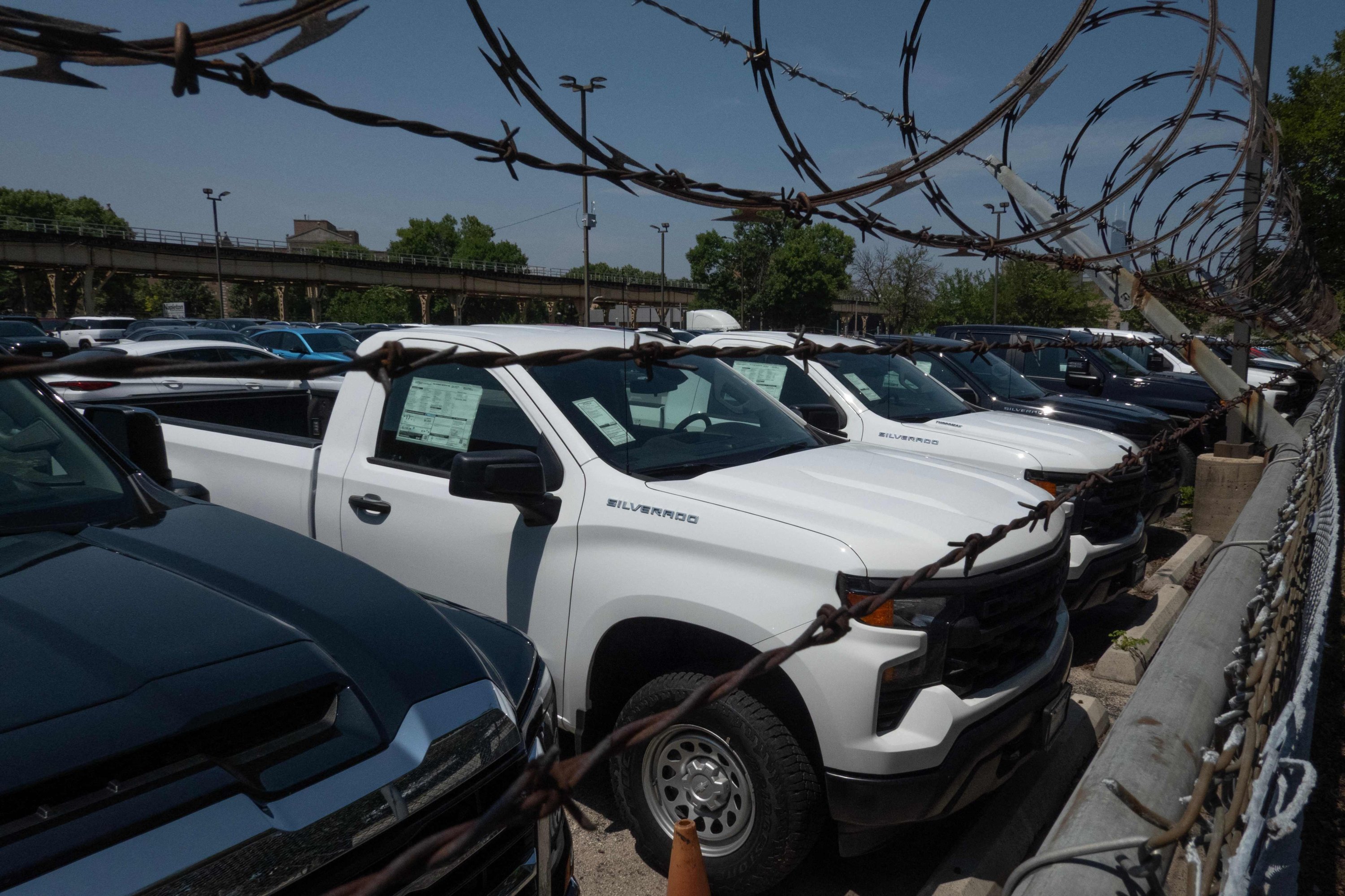
Clive Sutton, a British car dealer in London who sells luxury American models, said his buyers were drawn to the rarity of vehicles like the giant Cadillac Escalade. But he admitted it was a challenge.
“There are people that want that car because of its exclusivity and its perceived status,” Sutton said. “But it’s not the most easy car to find a parking space for, certainly in central London.”
Competitive market
Trump has also put pressure on South Korea to open its market to American cars and said duty-free access was part of the trade deal the two countries agreed last week.
There, imported vehicles account for less than one-fifth of the car market and U.S. models for only 16% of the imported car segment, which is dominated by German rivals, according to data from the Korea Automobile Importers & Distributors Association.
German manufacturers have also carved out a strong presence in Japan’s luxury market. Mercedes-Benz sold more than 53,000 vehicles last year, making it the most popular foreign brand, followed by BMW at more than 35,000. Japanese automakers say Europeans have been successful because they committed the time and resources to the market.
Detroit carmakers, meanwhile, are often associated with left-hand drive cars, which are more challenging to drive on the left-hand side of the road.
But some U.S. manufacturers are changing.
GM has offered the Corvette only in right-hand drive since the eighth generation version went on sale in 2021. That may be one reason why some 80% of buyers are new customers, a GM spokesperson said. The Corvette is the only model Chevy offers in Japan, and it has sold fewer than 1,000 of them a year for the last decade.
GM this year announced plans for a line-up of right-hand-drive Cadillac EVs and deliveries of the Lyriq started in July.
‘Wow, a foreign car’
Jeep, which sells right-hand drive models, has been the most popular American brand for more than a decade, the importer data showed. It sold just shy of 10,000 vehicles last year in Japan.
Yukimi Nitta used to drive a “kei” car but she was drawn to the Jeep Wrangler’s appearance, which she described as “friendly” and “outdoorsy.” The 42-year-old hair salon owner is now on her second Jeep – a limited-edition beige model – and hopes to switch again to another limited-edition color. Parking is tight but manageable, she said, and two of her friends have since bought Wranglers.
“People often say, ‘Wow, a foreign car!’ But once you drive it, it feels totally normal. I wish more people would try it,” she said.
While the Wrangler does burn through fuel quickly, the resale value is good, making it possible to switch out colours, something owners do, Nitta said.
A spokesperson for Jeep owner Stellantis said it actively promoted owner events. In July, it announced a collaboration with the “Jurassic World” movie series featuring a limited-edition pink Wrangler, the spokesperson said.
Big American cars and trucks might find it hard to follow in Jeep’s tracks.
Daniel Cadwell, an American living in Tokyo, exports used Japanese camper vans and wagons to the U.S. He said he was struck by the size of American cars whenever he went home.
“They are just excessively big,” said Cadwell, who runs Javan Imports in Portland with his U.S.-based business partner. “I think it is highly challenging for a car of that sort to be seen as attractive in Japan.”
Economy
Türkiye’s export outlook remains robust despite global uncertainty
The export climate for Turkish manufacturers remained strong in July as demand conditions continued to improve in their top markets despite uncertainty in global trade, a survey showed on Friday.
The Manufacturing Export Climate Index, which tracks the performance of Türkiye’s key export markets, rose to 51.3 from 51.0 in June, the Istanbul Chamber of Industry (ISO) said.
Readings above the neutral 50 threshold indicate an improvement in the export climate, while values below suggest deterioration. The latest figure marks the 19th consecutive month of improvement.
Economic activity in the United States, Türkiye’s second-largest export market for manufactured goods, accelerated in July, expanding at its fastest pace so far in 2025, the survey said.
The Middle East also contributed, with the United Arab Emirates (UAE) seeing strong non-oil activity despite a slight slowdown from June. Similar trends were recorded in Saudi Arabia and Kuwait.
Several major European export markets also registered growth in output. Spain recorded strong expansion, while Germany, the U.K., Italy and the Netherlands saw moderate increases.
In contrast, output contracted in France and Romania, which together account for about 7% of Türkiye’s manufacturing exports.
Russia’s output fell for a second month in July, with the pace of decline accelerating to its sharpest since October 2022, according to the survey.
Among all monitored economies, India posted the fastest growth, accelerating to a 15-month high. The steepest contraction occurred in Taiwan, followed by notable declines in Poland and Kenya.
Commenting on the findings, Andrew Harker, economics director at S&P Global Market Intelligence, said:
“In July, demand conditions showed improvement in most of the top 10 export markets of Turkish manufacturers. The notable expansion in the United States, where growth was recorded at its fastest pace since the beginning of 2025, was particularly encouraging for firms,” said said Andrew Harker, economics director at S&P Global Market Intelligence.
“In a global trade environment marked by heightened uncertainties, the overall improvement in economic activity in countries that constitute the main sources of external demand for Turkish exporters is a positive signal.”
Economy
Türkiye on verge of ending FX-protected deposit scheme
Türkiye is nearing an exit from a scheme shielding deposits against currency depreciation, a measure authorities began phasing out gradually in 2023 following a pivot toward more conventional economic policies.
Officials and the central bank have said the foreign exchange-protected Turkish lira deposits scheme, known as KKM, would be terminated by the end of 2025, though many bankers believe the exit could come even sooner.
Under the scheme, adopted in late 2021 to help reverse dollarization and counter a steep fall in lira, the Central Bank of the Republic of Türkiye (CBRT) had been protecting deposits by covering depreciation costs.
But authorities have been seeking to phase it out gradually and transition deposits into regular lira accounts, in part by dissuading companies and individuals from renewing the KKM accounts.
The value of deposits covered by the scheme has shrunk from a peak of $140 billion to below $11.8 billion, a figure now seen as negligible in the context of Türkiye’s $1.3 trillion economy. The exit from KKM has progressed much faster than initial market expectations.
Under the scheme, individuals and businesses were able to deposit lira in special accounts that were protected against exchange rate losses. The lira lost 44% of its value against the dollar in 2021, 29% in 2022, 37% in 2023, and 16% last year.
So far this year, it has depreciated by 13%.
Treasury and Finance Minister Mehmet Şimşek told Reuters this week the KKM balance had declined steadily thanks to the government’s exit strategy and tight monetary policy.
The KKM stock has fallen to almost TL 478 billion ($11.75 billion) from TL 3.4 trillion in August 2023. Its share of total deposits slid to 2% from 26.2%.
The balance dropped around TL 11.6 billion in the week through Aug. 1, according to the data from the Banking Regulation and Supervision Agency (BDDK) on Thursday.
After May 2023 elections, authorities turned to more conventional policies led by monetary tightening primarily aimed at curbing stubborn inflation.
With inflation having eased to 33.5% from a peak of 75% last year, the central bank has begun cutting rates again.
The total cost of the KKM is estimated at nearly $60 billion to the end of 2024, according to Reuters calculations based on central bank reports and budget data.
Last year, Türkiye ended other such policies, including a rule that forced banks to buy government bonds, effectively ending state control over the bond market. Earlier this year, the opening and renewal of KKM accounts for corporates was halted.
Since the return on KKM accounts is capped at 40% of the policy rate, they have long ceased to offer a meaningful alternative to regular lira deposits.
As the remaining KKM accounts held by individuals mature, a final regulation is expected to prohibit new openings and renewals, completing the phase-out of the scheme.
Economy
Global food prices hit 2-year high on rising meat, edible oils
Global food commodity prices climbed in July to their highest level in more than two years, driven by surging vegetable oil costs and record-high meat prices, which offset declines in cereals, dairy and sugar, data showed on Friday.
The United Nations’ Food and Agriculture Organization (FAO) Food Price Index, which serves as a global benchmark for food commodity prices, averaged 130.1 points in July, a 1.6% increase from June, FAO said.
That was the highest reading since February 2023, though the index was 18.8% below its peak of March 2022, which followed Russia’s full-scale invasion of Ukraine.
FAO’s meat price index hit a new all-time high of 127.3 points, up 1.2% from its previous peak in June, as strong import demand from China and the United States boosted beef and sheep meat prices, the agency said.
U.S. beef imports have climbed after drought led to a decline in the domestic cattle herd. China shipped in record amounts of beef last year amid growing popularity of the meat, though an official probe into imported beef has raised uncertainty about Chinese demand.
In other meat markets, poultry prices rose slightly following the resumption of imports of Brazilian chicken by major buyers after Brazil regained its avian influenza-free status following action against a first farm-level outbreak.
In contrast, pig meat prices declined due to sufficient supplies and lower demand, particularly in the European Union, FAO added.
The agency’s vegetable oil index surged to 166.8 points, up 7.1% month-on-month and the highest level in three years.
This increase was driven by higher quotations for palm, soy, and sunflower oils due to robust global demand and tightening supplies, though rapeseed oil prices fell as new-crop supplies arrived in Europe, FAO said.
FAO’s cereal price benchmark eased to its lowest in almost five years, reflecting seasonal supply pressure from wheat harvests in the Northern Hemisphere.
Its separate rice index dropped 1.8% last month, driven by ample export supplies and weak import demand.
Dairy prices edged down for the first time since April 2024, with declines for butter and milk powders offsetting further gains for cheese.
FAO’s sugar price index eased for a fifth consecutive month on expectations of increased production in Brazil and India, despite indications of recovering global sugar import demand, the agency said.
FAO did not update its cereal supply and demand estimates this month.
Economy
Trump nominates top economic aide Stephen Miran for vacant Fed seat
U.S. President Donald Trump said Thursday he will nominate a top economic adviser to the Federal Reserve’s Board of Governors, temporarily filling a vacancy as he seeks to boost his sway over the independent central bank.
Trump said he has named Stephen Miran, the chair of the White House’s Council of Economic Advisers, to fill a seat vacated by Governor Adriana Kugler, a former President Joe Biden appointee who is stepping down Friday.
Kugler announced a surprise resignation last week, as she returns to her tenured professorship at Georgetown University.
Miran, if approved by the Senate, will serve until Jan. 31, 2026.
Trump said the White House continues to search for a permanent replacement to serve in the 14-year Fed Board seat that opens Feb. 1.
The appointment is Trump’s first opportunity to exert more control over the Fed, one of the few remaining independent federal agencies. Trump has relentlessly criticized the current chair, Jerome Powell, for keeping short-term interest rates unchanged, calling him “a stubborn MORON” last week on social media.
Miran has advocated for a far-reaching overhaul of Fed governance that would include shortening Board member terms, putting them under the clear control of the president, and ending the “revolving door” between the executive branch and the Fed.
He has also been a major defender of Trump’s income tax cuts and tariff hikes, arguing that the combination will generate enough economic growth to reduce budget deficits.
Miran, who obtained a PhD in economics from Harvard, also has played down the risk of Trump’s tariffs generating higher inflation, a major source of concern for Powell.
His 41-page essay titled “A User’s Guide to Restructuring the Global Trading System” has been seen as providing rationale for Trump’s aggressive trade policies.
The choice of Miran may heighten concerns about political influence over the Fed, which has traditionally been insulated from day-to-day politics.
Fed independence is generally seen as key to ensuring that it can take difficult steps to combat inflation, such as raising interest rates, that politicians might be unwilling to take.
Federal Reserve governors vote on all the central bank’s interest-rate decisions, as well as its financial regulatory policies.
Miran’s nomination, if approved, would add a near-certain vote in support of lower interest rates.
At its most recent meeting last week, Fed officials kept their key rate unchanged at 4.3%, where it has stood after three rate cuts late last year. But two Fed governors – Christopher Waller and Michelle Bowman – dissented from that decision. Both were appointed by Trump in his first term.
Still, even with Miran on the board, 12 Fed officials vote on rate policy and many remain concerned that Trump’s sweeping tariffs could push inflation higher in the coming months.
After the July jobs report was released last Friday, Miran criticized Powell for not cutting rates, saying that Trump had been proven correct on inflation during his first term and would be again.
The president has pressured Powell to cut rates under the belief that his tariffs will not fuel higher inflationary pressures.
“What we’re seeing now in real time is a repetition once again of this pattern where the president will end up having been proven right,” Miran said on MSNBC.
“And the Fed will, with a lag and probably quite too late, eventually catch up to the president’s view.”
Trump said Miran would do an “outstanding” job in his new post.
“Has been with me from the beginning of my Second Term, and his expertise in the World of Economics is unparalleled,” Trump wrote on Truth Social. “Congratulations Stephen!”
-
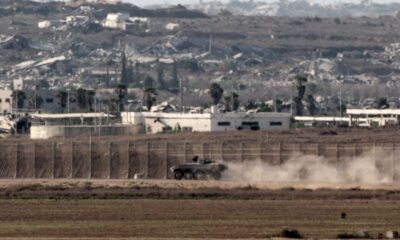
 Politics2 days ago
Politics2 days agoTürkiye urges int’l pressure to stop Israel’s Gaza plan
-
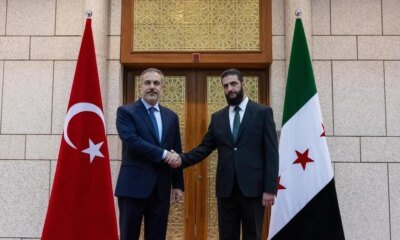
 Daily Agenda3 days ago
Daily Agenda3 days agoLAST MINUTE | Minister Fidan was accepted by the co-Shara
-

 Sports3 days ago
Sports3 days agoFenerbahçe’s UCL hopes hinge on Istanbul after Feyenoord loss
-
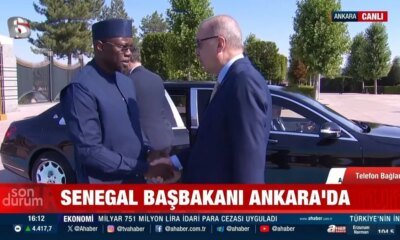
 Daily Agenda3 days ago
Daily Agenda3 days agoSenegal Prime Minister in Ankara – LAST MINUTE NEWS
-

 Lifestyle3 days ago
Lifestyle3 days agoBozcaada: Türkiye’s Aegean island paradise with rich cultural tapestry
-
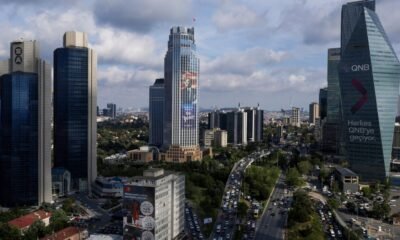
 Economy2 days ago
Economy2 days agoTürkiye on verge of ending FX-protected deposit scheme
-
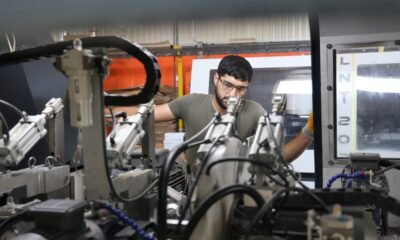
 Economy2 days ago
Economy2 days agoTürkiye’s export outlook remains robust despite global uncertainty
-

 Sports3 days ago
Sports3 days agoHolders Galatasaray return to action as Süper Lig kicks off in Gaziantep




